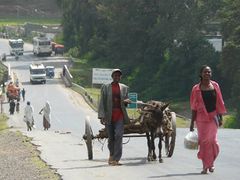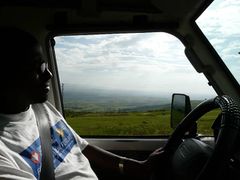Ethiopia
| Information | |
| Language: | Amharic |
| Capital: | Addis Ababa |
| Population: | 78,254,090 |
| Currency: | Birr (ETB) |
| Hitchability: | <rating country='et' /> |
| Meet fellow hitchhikers on Trustroots | |
| <map lat='9.622414142924805' lng='38.60595703125' zoom='5' view='0' float='right' /> | |
| Check out hitchhiking spots on Hitchmap | |

Ethiopia is listed as one of the world poorest countries, and very few people have cars there. Hitchhiking is really easy in Ethiopia. Any type of arm motion are use of the thumb will get you a ride. Make sure you know that the ride is free. In Amharic, the most widespread language used by most people to some degree "Birr nuhtzuh" means free, in Afan Oromo the word is something like "Gahtee-malee". English use is pretty uncommon outside of the cities, and the truckers who provide so many of the rides or not often English speakers. The roads are pretty good in Ethiopia and combined with the ease of hitching almost everywhere in the country is accessible. Hitching within the city of Addis Ababa is very easy and a great way to meet people. The train around Addis is also very cheap.
Ethiopia is a fairly safe country, however the faranji frenzy will definitely quickly become an annoyance as you travel throughout the country. Theft is pretty unheard of even in the cities. The children in much of Ethiopia are totally insane and will just start screaming upon seeing a foreigner. Children in the rural areas on West Amhara being the worst and will often just start throwing rocks at people and/or following in a large crowd.
One of the hardest parts about traveling Ethiopia is finding a place to sleep. Much of the country is densely populated. In Amhara and Tigray people are extremely suspicious of people walking on to their land or forests toward night time and may call the village to intervene. Hotels are about 50-60 birr (2.50$-3.00) for a single person and 70-80 for two people. The prices are higher in Addis Ababa and the eastern cities. Maybe fifty percent of the hotel rooms have bedbugs so I'd learn the signs and check before buying a room. The Ethiopian Orthodox Church traditionally keeps forested space near their churches and these can sometimes be slept in.
The police don't have much of a corruption problem and only seem to intrude heavily on the traveler's life in much of Benishangul-Gumuz.
Ethiopian culture in many of the regions can be quite abrasive. People yell often and catcall at women. In the Amhara region litigation is the "national sport" and people love to argue. Make sure you know a price firmly before handing someone money. House-ups are relatively uncommon but it is less uncommon for a rich person to buy you a hotel. Food is cheap and most people who like it really like it. Eating vegan is really easy. Water quality is low.
The country's car license plate system is very specific: the colour states the status of the ownership (Blue for Private Ownership/ Black for Government / Orange for Businesses or NGOs / Red for Taxis). The NGOs plate always starts with a number (generally 35, other numbers simply specify the origins of the local organisation) while CD (in White/Yellow/Black) represents embassies and diplomatic cars with the first number specifying the country of origin. The 2 letters of the region of registration also appears on the license plate, both in Latin alphabet and local Amharic; As example, AA stands for Addis Ababa.
Update 2018: The license plate has changed a bit. First off, it is the letters and numbers that are colored and not the plates themselves. Secondly, a new green color has been introduced and it wasn’t clear what it meant. A number of types of vehicles seemed to have it from private cars to buses. And taxis didn’t seem to be exclusively red.
Experiences
In the summer of 2010, Gerben hitchhiked through Ethiopia, from the Sudanese border crossing near Gonder to the Kenyan border at Moyale. His experience was very positive, and even though little children and also adults were very curious whenever he passed through a village, he experienced none of the rock throwing mentioned in other reports. Waiting time was generally short.
In February 2012, KiwiAoraki hitchhiked in some areas of Ethiopia. Locals, especially away from tourist areas can either be very curious or a real annoyance. It can be difficult to get a lift if you have a mob of 8 children following you. When he hitched from Harar to Addis Ababa he was picked up by an NGO vehicle and given a lift for 70 km without charge. A ute then picked him up going all the way to Addis, but the driver got angry upon dropping him off due to not having any birr. Drivers usually expect payment from hitchhikers, especially foreigners.
in October 2018, TheLoneBaker hitchhiked from the Sudan border to the Kenya border. He only encounter a single child who threw rocks and it wasn't directed at him as a foreigner. He was on a minibus that had offered him a free lift and the child threw the rock at the bus. SO perhaps this supposed rock throwing is not actually directed at foreigners so much as just bored children throwing rocks at moving targets. Hitchhiking itself was quite easy especially inside the city limits of Addis Ababa. He was also offered a hotel room almost every single night as opposed to being invited inside peoples homes. Again though, none of the drivers expected payment when asked beforehand.
Borders
According to the Lonely Planet, the border with Djibouti through Galafi is accessible only by hitching for its last length with the load of truckers doing the road between Djibouti Harbour and Awash where a payment of about 150-200Birr (from Logiya) can be expected.
Note that hitching along that road could reveal extremely harsh and dangerous due to local banditry and more especially due to the harshness of this desertic environment (along the Awash-Djibouti Road).
There are borders with:
- Somalia/Somaliland: via Jijiga (to Somaliland)
- Kenya: via Moyale
- Sudan: via Metemat, note that visa is required in advance which takes up to one month to obtain.
- South Sudan
Cities
Caution
- Beware of Landmines at the border regions to Somalia, Sudan, Eritrea and Kenya!
- Some Regions are simply closed for Foreigner, either due to the risk of attack, local tension or banditry. These usually includes the Ethiopian Somali Region (Werder) and the border with Eritrea. Other region such as the southwestern border with Sudan and Kenya as well as the Afar region can be volatile, so inquire before you go.
- Refrain from giving to beggars or children, be it small changes, pencils or any goods whatsoever as these raises their dependency and expectation on tourist.
Links
- My time in Ethiopia, August 19, 2005 by Hologram
- Ethiopia at Wikivoyage
- Ethiopia on digihitch
- Articles on abgefahren-ev.de/blogs about Ethiopia (de)
Nomadwiki & Trashwiki
Check Trashwiki for dumpsters...and share your wisdom :)
